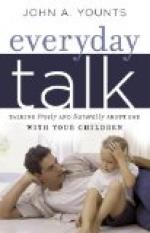Where resonance of voice is lacking, it can be rapidly developed by means of humming the letter m, with lips closed, and endeavoring to make the face vibrate. The tone should be kept well forward throughout the exercise, pressing firmly against the lips and hard palate. Later the exercise may begin with the humming m, and be developed, while the lips are opened gradually, into the tone of ah, still aiming to maintain the original resonance.
The speaking voice is capable of most wonderful development. There is a duty devolving upon everyone to cultivate beauty of vocal utterance and diction. Crudities of speech so commonly in evidence are mainly due to carelessness and neglect. It is a hopeful sign, however, that greater attention is now being given to this important subject than heretofore. Surely there is nothing more important than the development of the principal instrument by which men communicate with one another. As Story says:
“O, how our organ
can speak with its many and wonderful voices!—
Play on the soft lute
of love, blow the loud trumpet of war,
Sing with the high sesquialter,
or, drawing its full diapason,
Shake all the air with
the grand storm of its pedals and stops.”
HOW TO TELL A STORY
Someone has wittily said that only those in their anecdotage should tell stories. De Quincey wanted all story-tellers to be submerged in a horse-pond, or treated in the same manner as mad dogs. But story-telling has its legitimate and appropriate use, and if certain rules are observed may give added charm to conversation and public speaking.
It requires a fine discrimination to know when to tell a story, and when not to tell one though it is urging itself to be expressed. Few men have the rare gift of choosing the right story for the particular occasion. Many men have no difficulty in telling stories that are insufferably long, pointless, and uninteresting.
We have all been victims of a certain type of public speaker who begins by saying, “Now I don’t want to bore you with a long story, but this is so good, etc.,” or “An incident occurred at the American Consulate in Shanghai, which reminds me of an awfully good story, etc.” When a speaker prefaces his remarks with some such sentences as these, we know we are in for an uncomfortable time.
As far as possible a story should be new, clever, short, simple, inoffensive, and appropriate. As such stories are scarce, it is advisable to set them down, when found, in a special note-book for convenient reference. It is said that Chauncey M. Depew, one of the most gifted of after-dinner speakers, was for many years in the habit of keeping a set of scrap-books in which were preserved stories and other interesting data clipped from newspapers and magazines. These were so classified that he could on short notice refresh his mind with ample material upon almost any general subject.




